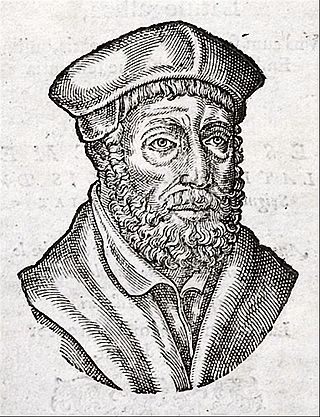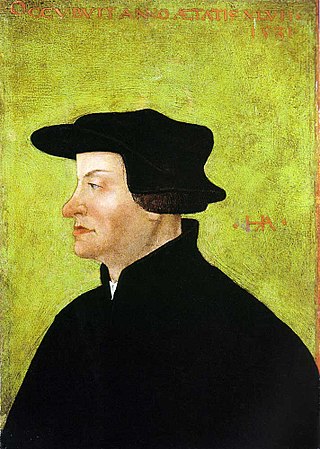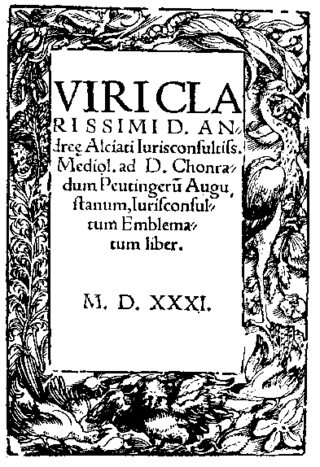Related Research Articles

Andrea Alciato, commonly known as Alciati, was an Italian jurist and writer. He is regarded as the founder of the French school of legal humanists.

Huldrych or Ulrich Zwingli was a Swiss Christian theologian, musician, and leader of the Reformation in Switzerland. Born during a time of emerging Swiss patriotism and increasing criticism of the Swiss mercenary system, he attended the University of Vienna and the University of Basel, a scholarly center of Renaissance humanism. He continued his studies while he served as a pastor in Glarus and later in Einsiedeln, where he was influenced by the writings of Erasmus.

Year 1531 (MDXXXI) was a common year starting on Sunday of the Julian calendar.
The 1480s decade ran from January 1, 1480, to December 31, 1489.
Year 1484 (MCDLXXXIV) was a leap year starting on Thursday of the Julian calendar, the 1484th year of the Common Era (CE) and Anno Domini (AD) designations, the 484th year of the 2nd millennium, the 84th year of the 15th century, and the 5th year of the 1480s decade.
This article presents lists of the literary events and publications in 1591.
This article contains information about the literary events and publications of 1530.

This article contains information about the literary events and publications of 1525.
This article contains information about the literary events and publications of 1520.
This article contains information about the literary events and publications of 1512.

An emblem is an abstract or representational pictorial image that represents a concept, like a moral truth, or an allegory, or a person, like a monarch or saint.

An emblem book is a book collecting emblems with accompanying explanatory text, typically morals or poems. This category of books was popular in Europe during the 16th and 17th centuries.

Usually known simply as the Emblemata, the first emblem book appeared in Augsburg (Germany) in 1531 under the title Viri Clarissimi D. Andreae Alciati Iurisconsultiss. Mediol. Ad D. Chonradum Peutingerum Augustanum, Iurisconsultum Emblematum Liber. Produced by the publisher Heinrich Steyner, the unauthorized first print edition was compiled from a manuscript of Latin poems which the Italian jurist Andrea Alciato had dedicated to his friend Conrad Peutinger and circulated to his acquaintances. The 1531 edition was soon followed by a 1534 edition authorized by Alciato: published in Paris by Christian Wechel, this appeared under the title Andreae Alciati Emblematum Libellus. The word "emblemata" is simply the plural of the Greek word "emblema", meaning a piece of inlay or mosaic, or an ornament: in his preface to Peutinger, Alciato describes his emblems as a learned recreation, a pastime for humanists steeped in classical culture.

Hans Asper was a Swiss painter best known for his portraits.
Protestant Reformers were theologians whose careers, works and actions brought about the Protestant Reformation of the 16th century.
The Swiss Brethren are a branch of Anabaptism that started in Zürich, spread to nearby cities and towns, and then was exported to neighboring countries. Today's Swiss Mennonite Conference can be traced to the Swiss Brethren.

János Zsámboky or János Zsámboki or János Sámboki, was a Hungarian humanist scholar: physician, philologist and historian.

The theology of Ulrich Zwingli was based on an interpretation of the Bible, taking scripture as the inspired word of God and placing its authority higher than what he saw as human sources such as the ecumenical councils and the church fathers. He also recognised the human element within the inspiration, noting the differences in the canonical gospels. Zwinglianism is the Reformed confession based on the Second Helvetic Confession promulgated by Zwingli's successor Heinrich Bullinger in the 1560s.
Nationality words link to articles with information on the nation's poetry or literature.
Nationality words link to articles with information on the nation's poetry or literature.
References
- ↑ "1531". La vie de Louise Labé. Archived from the original on 4 February 2009. Retrieved 22 December 2014.
- ↑ Magnusson, Magnus, ed. (1990). Chambers Biographical Dictionary (5th ed.). Cambridge University Press; W. & R. Chambers. ISBN 0-550-16040-X.
- ↑ Cox, Michael, ed. (2004). The Concise Oxford Chronology of English Literature. Oxford University Press. ISBN 0-19-860634-6.
- ↑ Edward J. Furcha; McGill University. Faculty of Religious Studies (1985). Huldrych Zwingli, 1484-1531: A Legacy of Radical Reform : Papers from the 1984 International Zwingli Symposium, McGill University. Faculty of Religious Studies, McGill University. pp. 78–9. ISBN 978-0-7717-0124-5.